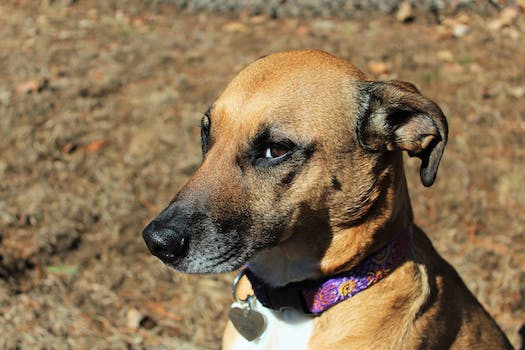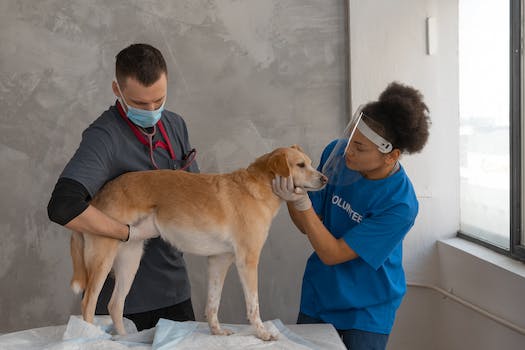

-
Table of Contents
"Discover the Top 15 Unhealthiest Dog Breeds: Understanding the Health Challenges of Canine Companions."
Introduction
Introduction:
This article provides an overview of the top 15 unhealthiest dog breeds. It is important to note that while these breeds may have a higher risk of certain health issues, it does not mean that every individual dog of these breeds will experience these problems. Responsible breeding practices, regular veterinary care, and a healthy lifestyle can help mitigate these risks.
Health Risks Associated with Unhealthy Dog Breeds
Health Risks Associated with Unhealthy Dog Breeds
When it comes to choosing a dog breed, many people focus on factors such as size, temperament, and appearance. However, it is equally important to consider the health risks associated with certain breeds. Some dog breeds are more prone to certain health conditions, which can lead to a lower quality of life for both the dog and its owner. In this article, we will explore the top 15 unhealthiest dog breeds and the health risks they are prone to.
First on the list is the Bulldog. While Bulldogs are known for their adorable wrinkled faces and friendly nature, they are unfortunately prone to a range of health issues. These include respiratory problems, skin infections, and joint disorders. Their short snouts make it difficult for them to breathe properly, leading to respiratory distress.
Next up is the Pug, another breed with a flat face. Pugs are prone to respiratory problems, eye issues, and obesity. Their short muzzles make it challenging for them to regulate their body temperature, which can lead to overheating and heatstroke.
Moving on, we have the Dachshund. These long-bodied dogs are prone to back problems, including intervertebral disc disease. Their elongated spines put them at a higher risk of developing herniated discs, which can cause pain and mobility issues.
Another breed with significant health risks is the Boxer. Boxers are prone to heart conditions, including arrhythmias and cardiomyopathy. They are also at a higher risk of developing certain types of cancer, such as mast cell tumors and lymphoma.
The Great Dane, known for its impressive size, is also on the list. These gentle giants are prone to a condition called bloat, which is a life-threatening condition where the stomach twists on itself. Great Danes are also at a higher risk of developing hip dysplasia, a painful condition that affects the hip joints.
Moving on, we have the Saint Bernard. These large dogs are prone to a condition called hip dysplasia, as well as heart problems. Their massive size puts extra strain on their joints and can lead to mobility issues as they age.
The Basset Hound, with its long ears and droopy eyes, is also on the list. Basset Hounds are prone to ear infections, as their long ears can trap moisture and bacteria. They are also at a higher risk of developing obesity, which can lead to a range of health issues, including diabetes and joint problems.
Next up is the Cocker Spaniel. These adorable dogs are prone to a range of eye problems, including cataracts and glaucoma. They are also at a higher risk of developing ear infections, as their long, floppy ears can trap moisture and debris.
Moving on, we have the Rottweiler. These powerful dogs are prone to hip and elbow dysplasia, as well as certain types of cancer. They are also at a higher risk of developing heart conditions, such as aortic stenosis.
The Dalmatian, known for its distinctive spots, is also on the list. Dalmatians are prone to urinary tract problems, including bladder stones and urinary tract infections. They are also at a higher risk of developing deafness, which is a genetic condition common in the breed.
Next, we have the Shar-Pei. These wrinkled dogs are prone to a range of skin problems, including allergies and infections. They are also at a higher risk of developing eye conditions, such as entropion, where the eyelids roll inward and irritate the eye.
Moving on, we have the Beagle. Beagles are prone to obesity, as they have a tendency to overeat. This can lead to a range of health issues, including diabetes and joint problems. They are also at a higher risk of developing certain types of cancer, such as lymphoma.
The Pekingese, with its luxurious coat and regal appearance, is also on the list. Pekingese are prone to respiratory problems, eye issues, and dental problems. Their flat faces make it difficult for them to breathe properly, and their large, bulging eyes are more susceptible to injury and infection.
Next up is the Cavalier King Charles Spaniel. These adorable dogs are prone to heart conditions, including mitral valve disease. They are also at a higher risk of developing certain types of neurological conditions, such as syringomyelia.
Lastly, we have the Labrador Retriever. While Labs are generally considered a healthy breed, they are prone to obesity. Labs have a voracious appetite and a tendency to overeat, which can lead to a range of health issues, including diabetes and joint problems.
In conclusion, it is essential to consider the health risks associated with certain dog breeds before making a decision. While all dogs can experience health issues, some breeds are more prone to specific conditions. By being aware of these risks, potential dog owners can make an informed decision and provide the necessary care and attention to ensure their pet's well-being.
Understanding the Genetic Factors Behind Unhealthiest Dog Breeds

Understanding the Genetic Factors Behind Unhealthiest Dog Breeds
When it comes to choosing a dog, many people consider factors such as size, temperament, and exercise needs. However, one crucial aspect that is often overlooked is the breed's genetic health. Just like humans, dogs can be prone to certain health conditions due to their genetic makeup. In this article, we will explore the top 15 unhealthiest dog breeds and delve into the genetic factors that contribute to their health issues.
1. Bulldog
The Bulldog, with its distinctive appearance and lovable personality, is unfortunately prone to a range of health problems. These include respiratory issues, hip dysplasia, and skin infections. These health issues can be attributed to the breed's genetic predisposition.
2. Pug
Pugs are known for their adorable wrinkled faces and playful nature. However, they are also prone to several health conditions, including breathing difficulties, eye problems, and obesity. These health issues are a result of the breed's genetic structure.
3. Boxer
Boxers are energetic and loyal companions, but they are also susceptible to a variety of health problems. These include heart conditions, hip dysplasia, and certain types of cancer. Genetic factors play a significant role in the development of these health issues.
4. Dalmatian
Dalmatians are famous for their unique coat pattern and energetic personality. However, they are prone to several health conditions, including deafness, urinary stones, and skin allergies. These health issues are linked to the breed's genetic makeup.
5. German Shepherd
German Shepherds are intelligent and versatile dogs, often used in various working roles. However, they are susceptible to several health problems, including hip and elbow dysplasia, degenerative myelopathy, and digestive issues. These health issues have a genetic basis.
6. Basset Hound
Basset Hounds are known for their long ears and droopy eyes. Unfortunately, they are prone to several health conditions, including obesity, ear infections, and back problems. These health issues can be attributed to the breed's genetic predisposition.
7. Saint Bernard
Saint Bernards are gentle giants, but they are also prone to several health problems. These include hip and elbow dysplasia, heart conditions, and bloat. Genetic factors contribute significantly to the development of these health issues.
8. Great Dane
Great Danes are known for their imposing size and gentle nature. However, they are prone to several health conditions, including hip dysplasia, heart disease, and bloat. These health issues are influenced by the breed's genetic makeup.
9. Cocker Spaniel
Cocker Spaniels are popular family pets, but they are also prone to several health problems. These include ear infections, eye conditions, and obesity. Genetic factors play a significant role in the development of these health issues.
10. Rottweiler
Rottweilers are loyal and protective dogs, but they are also susceptible to several health conditions. These include hip and elbow dysplasia, heart disease, and certain types of cancer. Genetic factors contribute to the development of these health issues.
11. Beagle
Beagles are friendly and curious dogs, but they are prone to several health problems. These include obesity, ear infections, and certain types of cancer. These health issues have a genetic basis.
12. Shih Tzu
Shih Tzus are small and affectionate dogs, but they are also prone to several health conditions. These include eye problems, dental issues, and respiratory problems. Genetic factors play a significant role in the development of these health issues.
13. Dachshund
Dachshunds are known for their long bodies and short legs. Unfortunately, they are prone to several health conditions, including back problems, obesity, and dental issues. These health issues can be attributed to the breed's genetic predisposition.
14. Labrador Retriever
Labrador Retrievers are friendly and outgoing dogs, but they are also susceptible to several health problems. These include hip and elbow dysplasia, obesity, and certain types of cancer. Genetic factors contribute to the development of these health issues.
15. Golden Retriever
Golden Retrievers are intelligent and loyal companions, but they are prone to several health conditions. These include hip and elbow dysplasia, certain types of cancer, and heart disease. These health issues have a genetic basis.
In conclusion, understanding the genetic factors behind the unhealthiest dog breeds is crucial when considering a new furry family member. By being aware of the potential health issues associated with certain breeds, prospective dog owners can make informed decisions and provide the necessary care for their beloved pets.
Tips for Caring for Unhealthy Dog Breeds
Dogs are often considered to be man's best friend, providing companionship, loyalty, and love. However, just like humans, dogs can also suffer from various health issues. Some dog breeds are more prone to certain health problems than others, making them less healthy overall. In this article, we will discuss the top 15 unhealthiest dog breeds and provide some tips for caring for these breeds.
1. Bulldog: Bulldogs are known for their adorable wrinkled faces and stocky bodies. However, they are prone to a variety of health issues, including respiratory problems, hip dysplasia, and skin infections. Regular vet check-ups and a balanced diet are essential for their well-being.
2. Pug: Pugs are small, charming dogs with a distinctive wrinkled face and curly tail. Unfortunately, they are prone to respiratory problems, eye issues, and obesity. Regular exercise and a healthy diet can help manage these health concerns.
3. Dachshund: Dachshunds, also known as wiener dogs, have long bodies and short legs. This breed is prone to back problems, obesity, and dental issues. Regular exercise, a balanced diet, and dental care are crucial for their overall health.
4. Basset Hound: Basset Hounds are known for their long ears and droopy eyes. However, they are prone to obesity, ear infections, and joint problems. Regular exercise, a controlled diet, and proper ear care are essential for their well-being.
5. Saint Bernard: Saint Bernards are large, gentle dogs known for their rescue abilities. However, they are prone to hip dysplasia, heart problems, and obesity. Regular exercise, a balanced diet, and regular vet check-ups are crucial for their health.
6. Great Dane: Great Danes are one of the largest dog breeds, known for their gentle nature. However, they are prone to heart problems, bloat, and joint issues. Regular exercise, a controlled diet, and proper monitoring of their health are essential.
7. Boxer: Boxers are energetic and playful dogs with a muscular build. However, they are prone to heart problems, cancer, and hip dysplasia. Regular exercise, a balanced diet, and regular vet check-ups are crucial for their well-being.
8. Cocker Spaniel: Cocker Spaniels are known for their beautiful, long ears and friendly nature. However, they are prone to ear infections, eye problems, and obesity. Regular grooming, proper ear care, and a controlled diet are essential for their health.
9. Dalmatian: Dalmatians are famous for their unique coat pattern and energetic nature. However, they are prone to deafness, urinary stones, and skin allergies. Regular vet check-ups, a balanced diet, and proper grooming are crucial for their well-being.
10. Beagle: Beagles are small, friendly dogs known for their keen sense of smell. However, they are prone to obesity, epilepsy, and back problems. Regular exercise, a controlled diet, and regular vet check-ups are essential for their health.
11. Shih Tzu: Shih Tzus are small, fluffy dogs with a friendly and affectionate nature. However, they are prone to eye problems, dental issues, and obesity. Regular grooming, proper dental care, and a balanced diet are crucial for their overall well-being.
12. Labrador Retriever: Labrador Retrievers are popular family pets known for their friendly and outgoing nature. However, they are prone to obesity, hip dysplasia, and ear infections. Regular exercise, a controlled diet, and proper ear care are essential for their health.
13. Chihuahua: Chihuahuas are small dogs with big personalities. However, they are prone to dental issues, heart problems, and patellar luxation. Regular dental care, regular vet check-ups, and a balanced diet are crucial for their overall well-being.
14. Rottweiler: Rottweilers are large, powerful dogs known for their loyalty and protective nature. However, they are prone to hip dysplasia, heart problems, and obesity. Regular exercise, a controlled diet, and regular vet check-ups are essential for their health.
15. Golden Retriever: Golden Retrievers are friendly, intelligent dogs known for their loyalty and love for water. However, they are prone to cancer, hip dysplasia, and obesity. Regular exercise, a balanced diet, and regular vet check-ups are crucial for their overall well-being.
In conclusion, while all dogs require proper care and attention, some breeds are more prone to health issues than others. Understanding the specific health concerns of these breeds and taking appropriate measures can help ensure their well-being. Regular exercise, a balanced diet, regular vet check-ups, and proper grooming are essential for caring for these unhealthy dog breeds. By providing them with the care they need, we can help these dogs live happy and healthy lives.
Q&A
1. Which dog breeds are considered among the top 15 unhealthiest?
Some of the dog breeds considered among the top 15 unhealthiest include the Bulldog, Pug, Boxer, Saint Bernard, and Dalmatian.
2. What health issues are commonly associated with these breeds?
These breeds commonly experience health issues such as respiratory problems, hip dysplasia, heart conditions, skin allergies, and eye problems.
3. Are there any steps that can be taken to improve the health of these breeds?
Regular veterinary check-ups, proper nutrition, exercise, and responsible breeding practices can help improve the health of these breeds.
Conclusion
In conclusion, the top 15 unhealthiest dog breeds include the Bulldog, Pug, French Bulldog, Dalmatian, Boxer, Basset Hound, Saint Bernard, Great Dane, Irish Wolfhound, Newfoundland, Rottweiler, Bernese Mountain Dog, Cocker Spaniel, Cavalier King Charles Spaniel, and the English Toy Spaniel. These breeds are prone to various health issues such as respiratory problems, heart conditions, joint and bone disorders, and certain types of cancers. It is important for potential dog owners to be aware of these health risks and to provide proper care and regular veterinary check-ups to ensure the well-being of these breeds.












